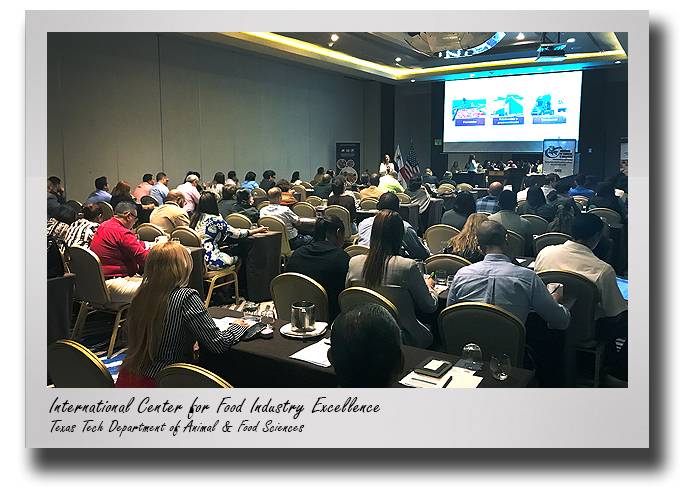AFS team receives USDA grant to further research imported food safety
By: George Watson
 Since 2014, a group of researchers in Texas Tech's College of Agricultural Sciences
and Natural Resources have worked closely with the USDA's Foreign Agricultural Services
to help those who export food to the United States meet the requirements of the Food
Safety Modernization Act.
Since 2014, a group of researchers in Texas Tech's College of Agricultural Sciences
and Natural Resources have worked closely with the USDA's Foreign Agricultural Services
to help those who export food to the United States meet the requirements of the Food
Safety Modernization Act.
 The act, signed in 2011 and implemented through several regulations in 2015, was enacted
to prevent foodborne illness in response to changes in the global food system, both
to improve public health and ensure the economic stability of the food system. For
six years, Texas Tech researchers have helped support food exporters within Latin
American and Caribbean countries to secure their access to the U.S. market while supplying
safe foods to consumers.
The act, signed in 2011 and implemented through several regulations in 2015, was enacted
to prevent foodborne illness in response to changes in the global food system, both
to improve public health and ensure the economic stability of the food system. For
six years, Texas Tech researchers have helped support food exporters within Latin
American and Caribbean countries to secure their access to the U.S. market while supplying
safe foods to consumers.
"Our efforts take advantage of a series of assessment tools that we developed, based on the regulations," said Marcos X. Sanchez-Plata, an associate professor of global food security in the Department of Animal & Food Sciences' International Center for Food Industry Excellence. "Those tools allow us to conduct risk-based diagnostics into food operations that export or are in the process of exporting foods to the U.S. to secure their market access by complying with new requirements and protect the health of U.S. consumers."
Nearing the end, the project recently received additional funding from the USDA Foreign Agricultural Services' Office of Capacity Building and Development in the form of a grant for $400,000 that will target Colombia, Ecuador, Paraguay and Peru with the latest iteration of these technical assistance efforts. The new project will be similar to the activities the project has undertaken in numerous countries throughout Central America and the Dominican Republic.
Sanchez-Plata said the final product is designed to provide a large repository website, hosted by Texas Tech and promoted to all countries in the western hemisphere, summarizing all the team's efforts from the last six years as well as providing access to educational materials, needs assessments and lessons learned.
Sanchez-Plata said the team's work includes diagnostics, training, advising and evaluation of interventions to determine the effectiveness of the team's capacity-building efforts.
 For the latest iteration of the project, researchers will assess the level of preparedness
of medium and small operations in the four countries to comply with FSMA rules using
the ICFIE diagnostic tools. After identifying the gaps, needs and priorities of these
operations, they will develop a customized implementation plan for each one and provide
needs-based technical assistance and targeted in-house training and scientific support
for development, adaptation, implementation and adoption of integrated food safety
management programs, emphasizing FSMA compliance.
For the latest iteration of the project, researchers will assess the level of preparedness
of medium and small operations in the four countries to comply with FSMA rules using
the ICFIE diagnostic tools. After identifying the gaps, needs and priorities of these
operations, they will develop a customized implementation plan for each one and provide
needs-based technical assistance and targeted in-house training and scientific support
for development, adaptation, implementation and adoption of integrated food safety
management programs, emphasizing FSMA compliance.
One year after implementation of these measures, the research team will assess their impact, as well as the level of compliance with the regulations by conducting internal audits and laboratory testing, as feasible, to determine the safety of the food being produced. The team also will conduct FSMA updates and complementary rules training programs the countries listed.
"The diagnostics evaluate the operations and products of facilities and allow us to identify gaps and needs for improvement," Sanchez-Plata said, "so we can tailor our technical assistance efforts by priorities and increase our chances of success in improving the safety of our food supply."
CONTACT: Marcos X. Sanchez-Plata, Associate Professor, Global Food Security, Department of Animal and Food Sciences, Texas Tech University at (806) 834-6503 or marcos.x.sanchez@ttu.edu
1008NM20
Davis College NewsCenter
-
Address
P.O. Box 42123, Lubbock, Texas 79409-2123, Dean's Office Location:Goddard Building, Room 108 -
Phone
(806)742-2808 -
Email
kris.allen@ttu.edu
